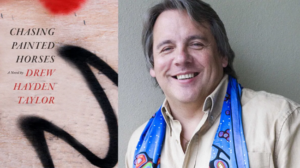Curve Lake First Nation author captures national award

By Sam Laskaris
CURVE LAKE FIRST NATION – It started as an inclusion in a book of a collection of short stories almost 25 years ago.
Now that story, which evolved into a one-act play and eventually a book of its own, has earned Curve Lake First Nation author Drew Hayden Taylor some national recognition.
It was announced on Sept. 24 that Taylor is this year’s winner of the Indigenous Literature Award, sponsored by the Periodical Marketers of Canada (PMC).
The PMC, established in 1942, is the national association of magazine and book wholesalers.
The award encourages family literacy and the promotion of First Nation, Métis and Inuit voices and experiences. This marked the seventh year the award has been handed out.
Taylor, who took top honours in Children’s and Young Adult/Adult category, was recognized for his book titled Chasing Painted Horses.
“This poetic story is a favourite of mine,” Taylor said.
When he first wrote the short story, it was titled Girl Who Loved Her Horses; that was also the name of the one-act play Taylor wrote about the story.
“I just felt there was more of the story that needed explaining,” he said.
That’s also why, even though it took a couple of decades, Taylor opted to expand his short story and one-act play and turn it into a book.
“The next logical step would be a movie,” he said. “But it’s out of my system now. And I’m very pleased this has become a novel now.”
Taylor said he did not know he had been nominated for the PMC’s Indigenous Literature Award. But he was aware of the accolade as one of his friends, Darrell Dennis, a member of the Shuswap Indian Reserve in British Columbia, had captured the award in 2015.
For winning the award, Taylor will receive $3,000.
In previous years, another perk of the award was the fact recipients would be given the chance to travel to various Indigenous communities to promote their book via presentation/reading sessions. The coronavirus disease 2019 (COVID-19) pandemic, however, has nixed those plans for 2020.
“That’s not happening this year— not in this environment,” Taylor said, adding he is disappointed about this fact. “I love travelling. I’ve been to about 150 First Nations throughout Canada and the United States. I love going around and seeing the different First Nations.”
As for Chasing Painted Horses, the book revolves around an Indigenous police officer, Ralph Thomas, who is working in Toronto.
Thomas discovers some graffiti of a horse in an alley one cold winter morning in the country’s most populous city.
The artwork is similar to one he had seen when he was a young child growing up on the Otter Lake reserve. The fictional Otter Lake, which is actually based on Curve Lake, is mentioned in many of Taylor’s other works.
Thomas recognizes the artwork in the alley as being similar to the work of a childhood friend, Danielle, who came from a dysfunctional family in Otter Lake.
During his youth, Ralph’s mother invited local children to draw pictures on her Everything Wall, situated in the family kitchen.
Danielle drew an excellent image of a horse, one that was deemed superior for somebody her age.
The whereabouts of Danielle and her family were unknown as they left mysteriously disappeared from Otter Lake many years ago.
Ralph’s sister Shelley and his best friend William are also featured in Chasing Painted Horses as he seeks answers to the familiar graffiti he stumbles upon.


